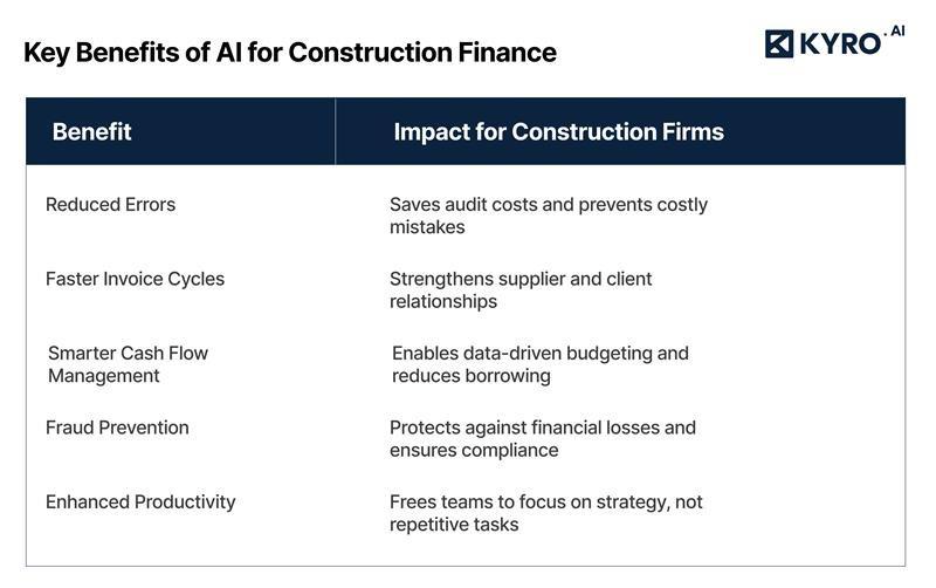
In the high-stakes world of construction, where tight deadlines, complex projects, and razor-thin margins are the norm, financial management can make or break a firm. Manual accounts payable (AP) and accounts receivable (AR) processes often lead to costly errors, delayed payments, and cash flow bottlenecks that frustrate construction managers, safety officers, insurers, and CFOs.
Now, artificial Intelligence (AI) has been introduced into the construction finance solution, that’s actually transforming construction finance with precision, speed, and strategic insights.
This article explores how AI simplifies accounts payable and receivable in construction, offering practical benefits and a clear roadmap to boost profitability and project success.
Construction firms juggle multiple projects, diverse suppliers, and thousands of transactions, making financial oversight a logistical nightmare. Manual processes with paper invoices, spreadsheet reconciliations, and endless email chains are too slow, error-prone, and drain resources.
According to a 2024 industry report, 82% of construction firms and contractors cite cash flow issues as a top challenge, often due to delayed invoicing and payment disputes.
AI-powered automation tackles these pain points head-on, offering:
For construction managers, the goal is to meet project timelines. For construction safety management officers, it’s ensuring compliance. Insurers focus on risk reduction, while CFOs aim to optimize budgets. To achieve all this, AI has become essential to stay competitive.
AI transforms Accounts payable from a tedious chore into a strategic asset. Here’s how it delivers value:
AI uses Optical Character Recognition (OCR) and machine learning to scan invoices, extract data (e.g., amounts, dates, supplier IDs), and match them to purchase orders or contracts.
For example, a mid-sized construction firm processing 500 invoices monthly may reduce data entry errors by approx. 92% after adopting AI and can save around 20 hours of staff time weekly. So, what happens with this is that a contractor perhaps may avoid overpaying a supplier due to AI flagging a mismatched invoice amount.
Benefit/impact: Cuts errors, accelerates cycles, and provides real-time liability tracking.
AI analyzes invoice patterns to detect duplicates, out-of-contract pricing, or suspicious activity. With AI-driven anomaly detection, AI flags duplicate invoices and prevent over payment.
Impact: Protects against financial losses and ensures compliance with insurers.
AI-driven systems analyze payment patterns, project cash flow, and vendor histories to identify opportunities for early payment discounts, without hurting liquidity. For instance, if the system detects surplus cash in a given period, it can automatically suggest paying certain suppliers early to earn a 1–2% discount.
For a general contractor managing multiple subcontractors, this means better control over outgoing cash while improving supplier trust and satisfaction.
Benefit/impact: Improves cash flow, boosts savings through discounts, and enhances supplier relationships.
AI streamlines invoice approvals by automatically validating transactions within preset limits and routing only exceptions for manual review. What once took days can now be completed in hours. This is an essential advantage for large construction projects where delays can disrupt entire schedules.
For example, a project manager can instantly approve a $50,000 equipment invoice through AI while exceptions, such as cost discrepancies, are flagged for review.
Benefit/impact: Speeds up approvals, reduces workflow bottlenecks, and allows finance teams to focus on higher-value tasks.
AI streamlines accounts receivable to ensure faster collections and healthier cash flow, addressing key pain points for construction firms.
AI-powered invoicing tools automatically create and send invoices while generating personalized payment reminders based on client behavior. This eliminates repetitive manual work and improves payment consistency across projects.
According to an EY Global Construction and Engineering Report (2024), companies using AI-driven billing systems saw a 37% reduction in overdue invoices and a 25% improvement in Days Sales Outstanding (DSO). AI tools analyze client payment patterns to time reminders effectively, helping contractors maintain healthy cash flow without straining client relationships.
Using historical data, KYRO AI’s predictive analytics identifies which clients are likely to pay late, enabling finance teams to take proactive steps. With AI Copilot, the construction management platform also helps forecast receivables, helping CFOs plan funding for upcoming projects with greater accuracy.
According to Thoughtful.ai (2025), AI-driven invoicing and receivables management can reduce Days Sales Outstanding (DSO) by up to 20% for construction companies, leading to faster payments and stronger liquidity (source).
KYRO AI flags potential disputes such as pricing errors or contract mismatches and recommends resolution steps, reducing resolution time by up to 50%. Many platforms demonstrate that AI can automate claim routing and prioritize high-impact disputes. Additionally, intelligent triage and document aggregation shorten dispute cycles from weeks to hours.
KYRO Analyzes cash flow trends to recommend early payment discounts, helping balance savings with liquidity. Contractors can use these insights to optimize working capital while reinforcing supplier relationships.
KYRO AI auto-approves invoices within pre-defined thresholds, escalating only exceptions for human review. This reduces approval times from days to hours, ensuring that project timelines remain uninterrupted.

To ensure success, construction firms should focus on four key factors.
AI isn’t just about automation. It’s about empowering construction firms with precision, control, and strategic foresight. By streamlining accounts payable and accounts receivable, AI reduces risks, optimizes cash flow, and drives profitability, positioning firms as industry leaders in a competitive landscape.
Ready to transform your construction finance?
KYRO AI’s AI-powered solutions streamline accounts payables and accounts receivable, delivering efficiency, accuracy, and healthier cash flow. Visit KYRO.ai to schedule a demo and take the first step toward financial excellence.
AI automates invoice validation and flags anomalies, cutting manual errors and fraud risks.
By speeding up payables and receivables, AI ensures predictable liquidity for project continuity.
Yes, AI centralizes data, offering real-time insights into project-specific budgets and payments.
Assess data quality and select an AI platform that integrates with your ERP system.
In the high-stakes world of construction, where tight deadlines, complex projects, and razor-thin margins are the norm, financial management can make or break a firm. Manual accounts payable (AP) and accounts receivable (AR) processes often lead to costly errors, delayed payments, and cash flow bottlenecks that frustrate construction managers, safety officers, insurers, and CFOs.
Now, artificial Intelligence (AI) has been introduced into the construction finance solution, that’s actually transforming construction finance with precision, speed, and strategic insights.
This article explores how AI simplifies accounts payable and receivable in construction, offering practical benefits and a clear roadmap to boost profitability and project success.
Construction firms juggle multiple projects, diverse suppliers, and thousands of transactions, making financial oversight a logistical nightmare. Manual processes with paper invoices, spreadsheet reconciliations, and endless email chains are too slow, error-prone, and drain resources.
According to a 2024 industry report, 82% of construction firms and contractors cite cash flow issues as a top challenge, often due to delayed invoicing and payment disputes.
AI-powered automation tackles these pain points head-on, offering:
For construction managers, the goal is to meet project timelines. For construction safety management officers, it’s ensuring compliance. Insurers focus on risk reduction, while CFOs aim to optimize budgets. To achieve all this, AI has become essential to stay competitive.
AI transforms Accounts payable from a tedious chore into a strategic asset. Here’s how it delivers value:
AI uses Optical Character Recognition (OCR) and machine learning to scan invoices, extract data (e.g., amounts, dates, supplier IDs), and match them to purchase orders or contracts.
For example, a mid-sized construction firm processing 500 invoices monthly may reduce data entry errors by approx. 92% after adopting AI and can save around 20 hours of staff time weekly. So, what happens with this is that a contractor perhaps may avoid overpaying a supplier due to AI flagging a mismatched invoice amount.
Benefit/impact: Cuts errors, accelerates cycles, and provides real-time liability tracking.
AI analyzes invoice patterns to detect duplicates, out-of-contract pricing, or suspicious activity. With AI-driven anomaly detection, AI flags duplicate invoices and prevent over payment.
Impact: Protects against financial losses and ensures compliance with insurers.
AI-driven systems analyze payment patterns, project cash flow, and vendor histories to identify opportunities for early payment discounts, without hurting liquidity. For instance, if the system detects surplus cash in a given period, it can automatically suggest paying certain suppliers early to earn a 1–2% discount.
For a general contractor managing multiple subcontractors, this means better control over outgoing cash while improving supplier trust and satisfaction.
Benefit/impact: Improves cash flow, boosts savings through discounts, and enhances supplier relationships.
AI streamlines invoice approvals by automatically validating transactions within preset limits and routing only exceptions for manual review. What once took days can now be completed in hours. This is an essential advantage for large construction projects where delays can disrupt entire schedules.
For example, a project manager can instantly approve a $50,000 equipment invoice through AI while exceptions, such as cost discrepancies, are flagged for review.
Benefit/impact: Speeds up approvals, reduces workflow bottlenecks, and allows finance teams to focus on higher-value tasks.
AI streamlines accounts receivable to ensure faster collections and healthier cash flow, addressing key pain points for construction firms.
AI-powered invoicing tools automatically create and send invoices while generating personalized payment reminders based on client behavior. This eliminates repetitive manual work and improves payment consistency across projects.
According to an EY Global Construction and Engineering Report (2024), companies using AI-driven billing systems saw a 37% reduction in overdue invoices and a 25% improvement in Days Sales Outstanding (DSO). AI tools analyze client payment patterns to time reminders effectively, helping contractors maintain healthy cash flow without straining client relationships.
Using historical data, KYRO AI’s predictive analytics identifies which clients are likely to pay late, enabling finance teams to take proactive steps. With AI Copilot, the construction management platform also helps forecast receivables, helping CFOs plan funding for upcoming projects with greater accuracy.
According to Thoughtful.ai (2025), AI-driven invoicing and receivables management can reduce Days Sales Outstanding (DSO) by up to 20% for construction companies, leading to faster payments and stronger liquidity (source).
KYRO AI flags potential disputes such as pricing errors or contract mismatches and recommends resolution steps, reducing resolution time by up to 50%. Many platforms demonstrate that AI can automate claim routing and prioritize high-impact disputes. Additionally, intelligent triage and document aggregation shorten dispute cycles from weeks to hours.
KYRO Analyzes cash flow trends to recommend early payment discounts, helping balance savings with liquidity. Contractors can use these insights to optimize working capital while reinforcing supplier relationships.
KYRO AI auto-approves invoices within pre-defined thresholds, escalating only exceptions for human review. This reduces approval times from days to hours, ensuring that project timelines remain uninterrupted.

To ensure success, construction firms should focus on four key factors.
AI isn’t just about automation. It’s about empowering construction firms with precision, control, and strategic foresight. By streamlining accounts payable and accounts receivable, AI reduces risks, optimizes cash flow, and drives profitability, positioning firms as industry leaders in a competitive landscape.
Ready to transform your construction finance?
KYRO AI’s AI-powered solutions streamline accounts payables and accounts receivable, delivering efficiency, accuracy, and healthier cash flow. Visit KYRO.ai to schedule a demo and take the first step toward financial excellence.
AI automates invoice validation and flags anomalies, cutting manual errors and fraud risks.
By speeding up payables and receivables, AI ensures predictable liquidity for project continuity.
Yes, AI centralizes data, offering real-time insights into project-specific budgets and payments.
Assess data quality and select an AI platform that integrates with your ERP system.

Rabiya Farheen is a content strategist and a writer who loves turning complex ideas into clear, meaningful stories, especially in the world of construction tech, AI, and B2B SaaS. She works closely with growing teams to create content that doesn’t just check SEO boxes, but actually helps people understand what a product does and why it matters. With a knack for research and a curiosity that never quits, Rabiya dives deep into industry trends, customer pain points, and data to craft content that feels super helpful and informative. When she’s not writing, she’s probably reading, painting, and exploring her creative side— or you'll find her hustling around for social causes, especially those that empower girls and women.